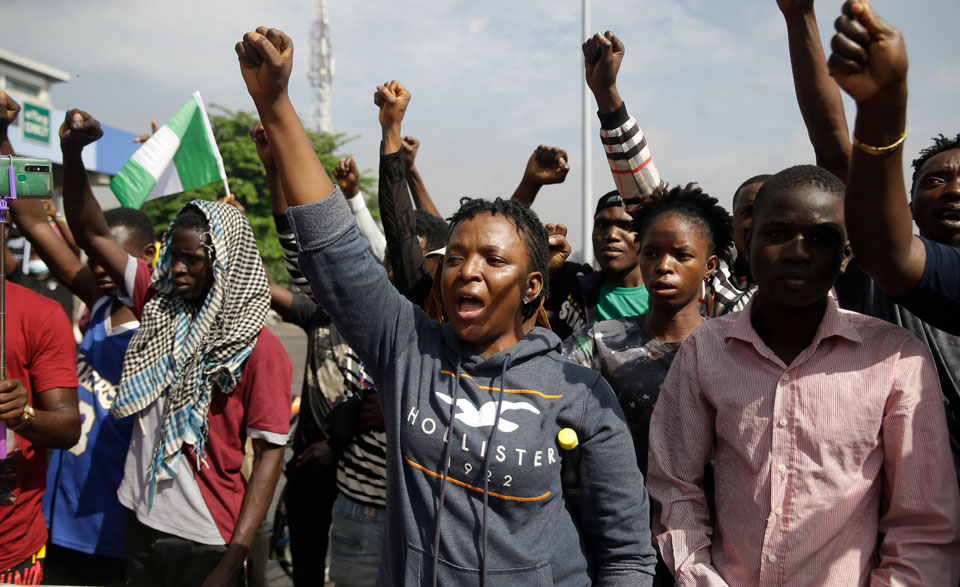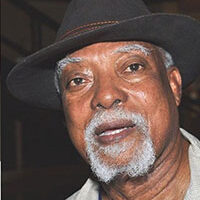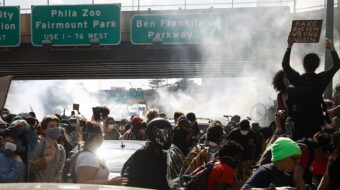
Editor’s Note: Nigerians have been in the streets since Oct. 7 in demonstrations against the government’s Special Anti-Robbery Squad (SARS), a notorious police unit accused of murder, extortion, and other abuses. It has since been disbanded, but protesters are pressing for wider democratic changes. The government’s violent response to the protests has killed dozens and provided fresh demands on the part of demonstrators. A number of police and military have also been killed amidst the conflict. President Muhammadu Buhari has tried to undermine the legitimate demands of the protests, insisting they’ve been “hijacked.” In this article from Morning Star, poet and novelist Lindsay Barrett—born in Jamaica but living in Nigeria since 1966—offers analysis of the latest developments and how the End SARS movement has morphed into a broader uprising.
The protest that started against the Special Anti-Robbery Squad (SARS), a hated police unit, has become endemic in various parts of Nigeria over recent weeks and now transformed into an uprising of the younger generation against impunity and oppression. This transformation has occurred spontaneously, but it is also being encouraged by critical rhetoric being voiced by some prominent and highly vocal older members of the citizenry.
However, as the government decides how to confront the consequences of the protest, it must not make the mistake of blaming the protesters for the actions of a few. The blame must be placed squarely on the actions and inactions of the government itself and it must listen carefully to the demands and recommendations being voiced by the participants in the protest.
It is only when government shows that it has the ability to listen to—and understand the motivation behind—the protests that the movement will achieve genuine relevance in the national discourse. The alternative to this is almost too dire to contemplate since the mood of the protesters has reached boiling point.
Each day sees the expansion of the targeted anomalies in governance that are listed by the participants in the protest. Now it is not the initial objective of the protest that is the core demand of the protesters. They are seeking the end of a whole catalog of official sins, rather than the simple disbandment of a police unit.
In embarking on the journey towards deeper protest, fundamental principles of disenchantment, and the formulation of wider demands, the End SARS movement has actually given the democratic order in Nigeria new life and the spirit of genuine popular deep-seated significance.

It will be particularly interesting to watch the way in which the government and the legislature eventually react to the expansion of the protest. It is the task of legislators to represent their constituents, many of whom can be counted among the End SARS protesters.
As a result of this, it is imperative that legislators who are genuinely committed to the task of representation of the people assess and consider the rhetorical criticism which the protesters appear to be reacting positively to.
Among the issues that seem to be influencing their commitment to expressing disenchantment and justifying the continued adherence of a substantial number of young people to the protest, the need to restructure the relationship between the regional states and the central government is prominent.
Unfortunately, much of the discussion around this topic sometimes gets trapped in conversations about regional and ethnic rivalry. The existence of unfair imbalances in privileges dispensed by government is an impression that most of the protesters seem to hold as valid.
Because of this, discussions of the need for change in the way government is run have become common currency of the discourse that is responsible for the protest’s continued viability.
Many young people believe that the current leadership is beholden to methods of governance that were inherited from the past and that unless these methods are jettisoned, the need for change will not be acknowledged by the authorities. This disbelief in the current validity of the leadership’s understanding of and empathy for progress is a major force.
In other words, the call for the end of the SARS police unit has metamorphosed into a call for an end to systemic fallacies that can lead to condoning things like SARS.
It now appears that the full impact of the End SARS movement has been to motivate young Nigerians to discuss the form and nature of their country’s existence and governance in a sustained and provocative manner.
When members of the older generation lend their voices to this discussion and raise disenchantment with historical events, such as the decision to change Nigeria’s governance system from the parliamentary form inherited from colonialism to the presidential system deposited by the military, the discourse deepens.

The importance of the movement is rooted in the fact that it has caught the imagination of a wide cross-section of Nigerian young people and that it can also relate to the concerns of older citizens.
In grappling with the major task of nation-building, which continues to confront Nigeria today, these concerns remain relevant to the task of building a viable nation. It is imperative that the government realizes that in nation-building, it is the average citizen that carries the prime burden and the End SARS movement is a major example of this.
Major challenges arise when the average citizen turns against institutions that have failed them such as the police. It becomes necessary for the government to acknowledge the right to protest and accept their call for an end to irregular conduct.
If the government does not recognize this necessity in time, then this could lead to a rise in public disenchantment that justifies civil disobedience. When the public feels justified in disobeying directives from the state, in little or no time the fundamental principles that sustain stability and social order will break down.
The End SARS movement is suggestive of this eventuality, as the protesters have turned out to be highly committed disobedient individuals who are dedicated to the cause of refusing to obey directives from the state. In fact, they have shown themselves to be deeply committed to disowning whatever pledge or promise the authorities make in attempting to alleviate the problem that they have identified.
Even when government said it had responded to the call to disband SARS, the movement responded by saying it wanted more substantive punitive action to be taken against those members of SARS whose actions had provoked and justified the protest.
What this response from the movement indicates is that it has generated enough internal momentum of disenchantment with the conduct of affairs of state that it will disobey any directive as a matter of course.
What that means is that the End SARS movement can be harnessed to confront a multitude of state actions.
The conversation surrounding state resources and how best to control or disburse them has become a central issue of public discourse, and the young protesters will soon consider such issues pertinent to their concerns. End SARS could eventually end many things in Nigeria.
However, it is imperative that we should be aware of the dangers that accompany the presence of this spirit of rebellion. Paramount among these is the danger of the movement being hijacked by thugs and advocates of destabilization for their own purposes.
It is important that government should realize that more than half of the country’s population is made up of people who are younger than the nation. What this means is that the majority of Nigerians are not likely to be attracted to arguments generated by the nationalism and patriotism linked to the independence movement.

As a consequence, the destruction of national unity does not frighten the main advocates of the present participation in the protest movement in Nigeria, and they are not afraid of the break-up of the nation.
It is instructive and cautionary though for them to take heed of what has occurred in other parts of Africa and the world where the destruction of national unity has been provoked, in Sudan, for example.
Nigeria has established a global presence in spite of its dysfunctional national characteristics, and if the movement can identify the positive fundamentals of national identity as a definite objective, that may serve to restore the spirit of patriotism and nationalistic excellence as a definite achievement that the country can aspire to.
It is unfortunate that so far the purpose and direction of the protest movement appears to be turning against this tide of positive nationalism. If this trend is allowed to fester and the government creates a situation in which disorder thrives, then the grave danger exists that the movement might provoke the end of Nigeria itself.












Comments